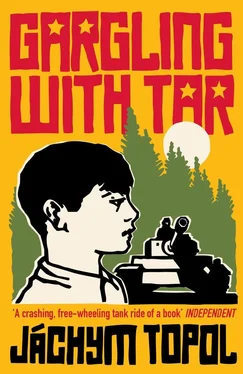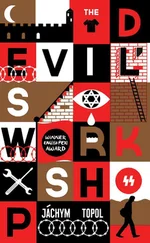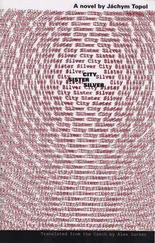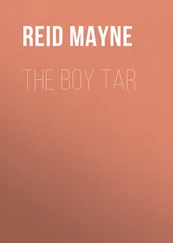Later, I was present at actions that presaged more spoils to come. The church in the village of Bataj held many treasures, which the Captain saved from the flames that destroyed the church. Carved saints, pictures of the Madonna or Czechia, silver and gold plate belonging to the priest and to God. In the village of Skryje the priest buried the church treasures under the entrance to the vicarage. He only volunteered this information under interrogation. He was happy to hand over lots of gold and silver teaspoons as well.
The captain’s sacks also accepted money. All currencies were welcome. After a string of interrogations, especially of cowardly non-combatants, we sometimes also found cute-looking money from those faraway, foreign Nato states Germany and America. Captain Yegorov took this as evidence that the bandit gangs were being financed by Western capital. There were many, many sacks.
It was a great honour for me to be allowed to assist Captain Yegorov during those peaceful evening moments, and sometimes I would tie up the sacks and sometimes untie them. The captain trusted me so much that he would even tie me to the sacks for the night. Having heaved his boots off by using me as leverage, he waved me away, and, tied to the sacks of valuables and money, I would snuggle down in my rugs.
Of course, after that Captain Yegorov carried on smoking, thinking or whistling on his camp bed. Sometimes he looked at his pictures. These came into his keeping after the capture of Tomašín and other pockets of resistance.
I must admit I was a bit surprised when, on one of my first days in the army, Captain Yegorov took me behind the tank and showed me these coloured pictures. They were images of sometimes comical animals from faraway places. He showed me a camel, a tiger, a duck-billed platypus, a kudu and other creatures, and asked if I’d seen any of them.
I assured him that, to the best of my knowledge, these animals didn’t live in Chapman Forest.
Sometimes, during rare moments of leisure, the other men of the ‘Happy Song’ tank column also looked at pictures like these.
Once I caught Gunner Kantariya swapping a picture of an elephant for one of a zebra with Gunner Timosha, while they engaged in a light-hearted squabble accompanied by bursts of laughter. Gunner Kantariya had two elephants in his collection, but not a single zebra.
I knew all these animals from my nature lessons long ago, when the nuns had taught us. And I also remembered many of the illustrations in The Catholic Book of Knowledge .
At this time I didn’t fully understand the ways of Soviet soldiers. I just assumed they were having lessons on the tanks.
It also occurred to me that they thought they were conquering Africa.
At the time, I knew nothing at all about the special assignment of the ‘Happy Song’ tank column.
That was soon to change.
That night I made the acquaintance of Willy. Willy Dagobert, the midget Dago.
I’d been crying in the night. I was lying wrapped in the rugs I was guarding, because it was the time of my guard duty, although after a day full of fighting I was in a kind of limbo, only then I wasn’t in limbo, I was just blubbering.
All of us kids from the Home from Home had learned not only to speak without moving our lips during the endless roll-calls and line-ups, but also to cry without making a sound, because if we’d disturbed the others in the dormitory, we’d have got a smack in the mouth; that’s how things were in the older boys’ dormitory, because one boy crying ruins everyone’s sleep.
Blubbering in silence is easy, provided the blubberer learns to catch the snot and saliva and tears and keep swallowing them as he breathes in and out; the rhythm can even restore his calm and he can fall asleep.
I was blubbering then because there wasn’t time to while our tank column pushed onwards or while we were conquering pockets of resistance, and above all there wasn’t time to process the images that kept popping up in my head.
That day, me, Gunner Timosha and Gunner Kantariya made up the crew of the lead tank, and we had just captured a fragrant avenue of cherry trees, so we were celebrating noisily, reaching up to drag down the branches full of cherries that arched above our heads, unpicked, because the Czechs who had previously been stubbornly defending the avenue were now lying on the ground with holes in their heads and bodies or had fled into the fields. And a new watch on Gunner Timosha’s wrist glinted under the blazing sun, and he was smiling, and Gunner Kantariya was laughing too, nudging me with his elbow and shrieking in Russian, ‘Ilya, where are all the Czech girls?’ We stuffed ourselves with cherries and our mouths were full of the sweet juice, and I was filled with the sweetness of the world, and I wanted the sub-machine-gunners to let me have a Kalashnikov as well, because I could handle a gun, they’d see! And I reached out for orderly Timosha’s sub-machine gun, but his face suddenly hardened, as did Gunner Kantariya’s face, and one said, ‘ Niet! ’ and the other said, ‘No you don’t!’, and I understood that even though I was one of them — that is, although I was the ‘Happy Song’ tank column’s interpreter — in reality I wasn’t quite one of them.
And I thought about what we had done to the Czechs who were defending the cherry avenue, and many others besides, and of course I wondered what the Czechs would do to me, despite my axle grease-blackened face, if ever I fell off the tank or something.
It was thoughts like these that troubled me as I cried silently among the sacks, and just before the darkness parted and I saw the midget Dago, Hanka kept appearing in my mind, I was back standing with her in the corridor, feeling her soft and firm and warm breast in the palm of my hand, and the image was so powerful and full of longing that I grew heavy and limp with all the sweetness of the world, which coursed in my bones as if through rigid pipes, and the image of Hanka flip-flopped with the image of the naked girl on television coming out of the water the day the Russkies came, and I nearly relived that very best moment in my life when I jerked myself off to my heart’s content leaning back on the barn wall.
But I couldn’t.
The thing is, in the middle of all that killing I couldn’t.
So I wasn’t like gunners Kantariya and Timosha and presumably all our other tank crewmen and sub-machine-gunners and pickup drivers, who went on about doing it with girls almost continuously both on the tanks and during rare moments of leisure in camp, talking like real blokes, in Russian.
I wasn’t a real bloke yet. I was just a child, and I was sick of it.
And so I tried to do it, but I couldn’t, and while the sweetness of the world drifted out of my reach, it was overtaken by a coldness and a futility that seemed to burrow deep inside me, as if driven by the chill wind blowing out of Chapman Forest.
And at that very moment the darkness seemed to part before my very eyes. A sack made the slightest of movements, and in the first glimmer of dawn I saw the strange face of the midget Dago.
14: We’re on the run! Animals. Meadows. The first kurgan
He had slashed the canvas of the tent and stepped inside, then pressed himself against one of the sacks and in the half-light of daybreak merged with it.
I didn’t know if he was a Czech sent to murder Captain Yegorov and steal his spoils of war or whether he was some bogeyman from Chapman Forest. My face was by his boots, but they weren’t boots, more like bootees, and I could see that if this were a man he must be very small, and at first I thought it might be one of the Bandits, but I was wrong.
I attacked at once, determined to destroy the creature and forgetting that I was attached to the precious sacks.
Читать дальше












